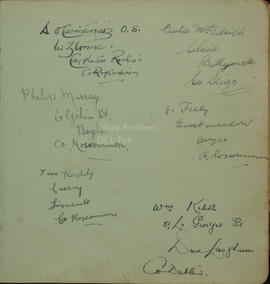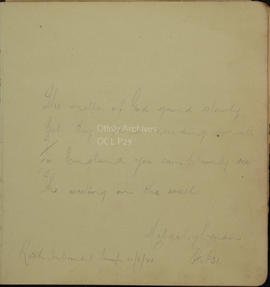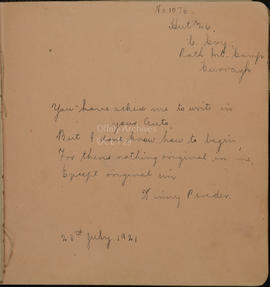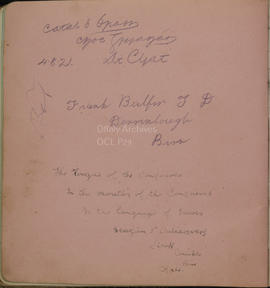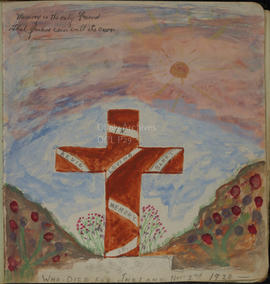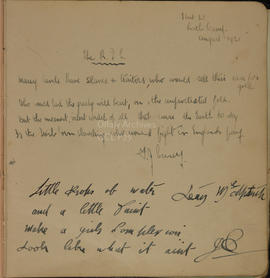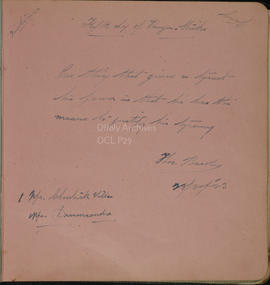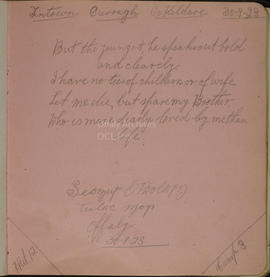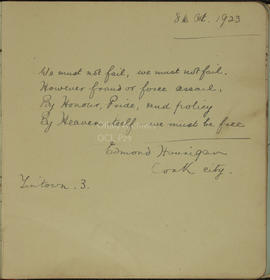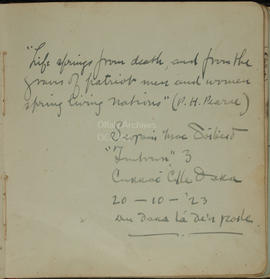Signatures of A. Ó Caomhánaigh (Roscommon), Bertie McGetrick (Sligo), Philip Murray (Roscommon), E. Feely (Roscommon), Tom Roddy (Roscommon) and William Kehoe (Dublin).
The Curragh
64 Archivistische beschrijving results for The Curragh
"The mills of God grind slowly
But they grind exceeding small
For England you can plainly see
The writing on the wall"
Malachy Lynam, Hut 31, Rath Internment Camp
Verse by Denis (Dinny) Pender, Internee 1076, Hut 26:
'You have asked me to write in your Auts
But I don't know where to begin
For there's nothing original in me
Except for original sin'
Signatures of Cathal O Broin (Dublin) and Frank Bulfin, T.D. (Derrinlough, Birr, Offaly).
Quote transcribed by Seaghan Ó Dulchaointigh, (Crinkle, Birr, Offaly): 'The tongue of the conqueror in the mouths of the conquered is the language of slaves'.
Unsigned watercolour of a burial cross with the inscription:
'In loving memory of Kevin Barry who died for Ireland Nov 2nd 1920'. Also captioned 'memory is the only friend that grieve [sic] can call its own.'
Verse transcribed by T. J. Casey, Hut 28:
'The R.I.C.
Many lands have slaves and traitors who would sell their race for gold
Who would lead the greedy wild beast, on the unprotected fold
But the meanest vilest wretch of all that curse the Earth today
Is the Irish-born slaveling who would fight in England's pay'
Note entitled 'Fifth Day of Hunger Strike' by Thomas [Barclay], Druncomndra, Dublin:
'One thing that gives a tyrant his power is that he has the means to justify his tyranny'.
Verse transcribed by Séamus Ó Faoláin (Tullamore), Hut 12, Camp 3, Tintown:
'But the youngest, he speaks out bold and clearly
I have no ties of children or of wife
Let me die, but spare mu brother,
Who is more dearly loved by me than life.'
Verse by Thomas Davis transcribed by Edmond Hourigan (Cork City), Tintown No. 3 Camp:
'We must not fail, we must not fail,
However fraud or force assail,
By Honour, Pride and policy
By Heaven, itself we must be free.'
Quote by Patrick Pearse transcribed by Seosamh Mac Dáibhéid, Tintown No 3 Camp, on the second day of the [hunger] strike ('An dara lá de'n stailc'):
'Life springs from death, and from the graves of patriot men and women spring living nations.'
